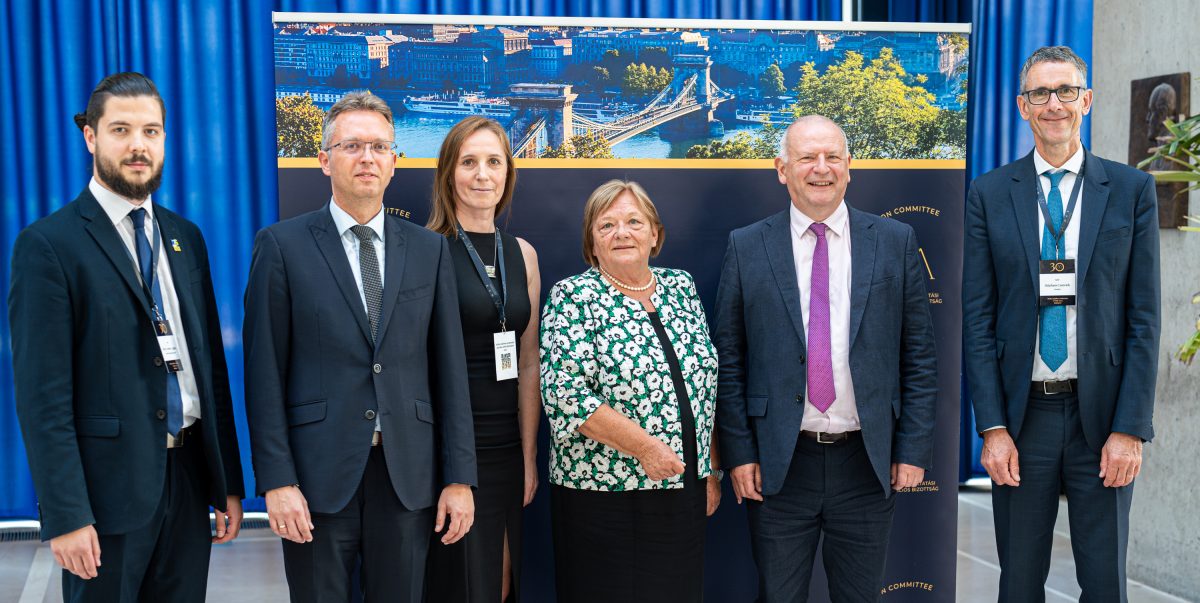The Hungarian Accreditation Committee (MAB) is one of the oldest accreditation organizations in Europe and the only higher education quality assurance agency in Hungary. Originally named the National Accreditation Committee (OAB), MAB was established by the 1993 Higher Education Act (Act LXXX) and began its operations in January 1994. To mark the 30th anniversary of its founding, a large-scale international professional event titled “MAB30 Jubilee Conference” was organized in Budapest on July 11, 2024, attended by many of MAB’s Hungarian and international partners.
The welcoming speeches of the celebratory event were delivered by Ferenc Bánhidy, Vice-Rector of the Semmelweis University, which university also hosted the conference, and by Valéria Csépe, President of MAB. Among the distinguished international guests were Douglas Blackstock, President of the European Association for Quality Assurance in Higher Education (ENQA), and Stéphane Lauwick, President of the European Quality Assurance Register for Higher Education (EQAR). In their presentations, they discussed the significance and future challenges of the two major organizations they lead, as well as MAB’s role and position in the European Higher Education Area (EHEA). The morning session also featured a presentation by Padraig Walsh, former ENQA President and Chief Executive Officer of the Irish quality assurance agency, who explained how the synergy between qualifications and quality works in the Irish higher education system, highlighting several best practices worth considering for Hungarian higher education. The morning program concluded with a presentation by the President of MAB, outlining the past, present, and future challenges of higher education quality assurance in Hungary.
The afternoon sessions focused on current issues directly affecting higher education. The first session explored the status of doctoral education in Europe and Hungary. Melita Kovačević, professor at the University of Zagreb and leader of numerous European projects and workgroups on doctoral education, and Guy Haug, a key expert in launching the Bologna Process, delivered their presentations by primarily addressing the European dimensions of the topic. The two presentations provided an overview on the changes in doctoral education since the Bologna Declaration and looked to the future of doctoral education in Europe. László Gulácsi, Vice-Rector for Science at Óbuda University, analysed the challenges of doctoral education in Hungary, especially in the context of the global changes of the 21st century. The presentations were followed by a panel discussion where the speakers were joined by Norbert Bencze, President of the Association of Hungarian PhD and DLA Students, and Valéria Csépe, President of MAB, who also moderated the discussion. The panel participants engaged in a dialogue about the current form and functions of doctoral education, the responses to economic and social challenges, and the national and European frameworks.
The final session of the conference focused on issues related to learning outcomes-based and student-centred teaching and learning. Two presentations elaborated on the topic: Lana Par, Vice President of the European Students’ Union (ESU), discussed how student-centred learning, teaching, and assessment are connected to the Standards and Guidelines for Quality Assurance in the European Higher Education Area (ESG). Patrick Van den Bosch, head of the Flemish higher education quality assurance agency (VLUHR QA), illustrated the relationship between learning outcomes-based teaching and learning and quality assessment through the Flemish example. The closing panel discussion included the speakers, as well as Ronny Heintze, Deputy Director of the German AQAS quality assurance agency, and Bendegúz Dibusz, board member of the National Union of Students in Hungary (HÖOK). The panel was moderated by Péter Levente Lakatos, MAB’s director of international affairs. One of the main topics of the discussion was the importance of learning outcomes-based education and student-centeredness. The participants also addressed current issues related to the introduction of the micro-credentials system.
To close the anniversary conference, Balázs Hankó, Minister for Culture and Innovation, shared his thoughts on the role of MAB in the Hungarian higher education. The event closed with Valéria Csépe, President of MAB, thanking everyone for making the event a great success.
During the conference, MAB signed a Memorandum of Understanding with the following organizations:
- Agency for Higher Education of Republic of Srpska (AHERS, Bosnia and Herzegovina)
- National Entity for Accreditation and Quality Assurance in Higher Education (NEAQA, Serbia)
- Foundation for International Business Administration Accreditation (FIBAA, Germany)
The 30-year-old MAB remains confident that it can continue to collaborate successfully with Hungarian higher education institutions and European partner organizations to strengthen the culture of quality assurance in Hungary, thereby supporting Hungarian higher education in fulfilling its mission and enhancing its international reputation.
The presentations from the conference are available here.


